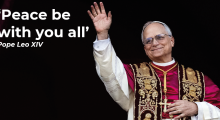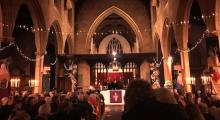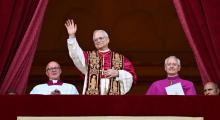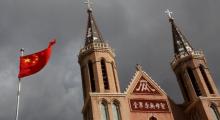Issued by the Catholic Center for Studies and Media - Jordan. Editor-in-chief Fr. Rif'at Bader - موقع أبونا abouna.org

The government of Nicaragua has ordered the closure of seven Catholic radio stations linked to a bishop who has been critical of President Daniel Ortega, as reported by Reuters. The announcement was made by Bishop Rolando Alvarez. The Nicaraguan telecommunications agency said the stations did not meet technical requirements to be on air.
This incident did not happen in isolation. Relations between the Catholic Church and Ortega deteriorated after 2018 following protests against the regime and a subsequent crackdown. In the town of Sebaco, protests erupted after a priest refused to hand over radio equipment and asked parishioners for help during a live video stream. Video on social media showed police firing shots and tear gas, before taking control of the parish and the radio station.
The Vatican has not publicly responded yet, although earlier this year it did react after the effective expulsion of its ambassador, calling the action unjustified and incomprehensible, again reported by Reuters. Archbishop Waldemar Sommertag had to leave the country following his criticism of the regime. For his part, Ortega has accused Catholic clergy of fermenting dissent.
In a statement at the time, the Vatican said: “(The Holy See) is convinced that such a grave, unjustified and unilateral measure does not reflect the sentiments of the Nicaraguan people, who are profoundly Christian.” In another recent development, 18 nuns were driven to the Costa Rica border and forced to leave as their Missionaries of Charity order was shut down.
The Catholic bishops conference issued a statement before the 2021 election, claiming Nicaragua lacked “the basic and indispensable conditions in order to hold free, fair and transparent elections.” The Archdiocese of Managua also denounced the violation of political and constitutional rights as well as “threats to the Catholic Church (and) offences against its priests and bishops.”
This surely is another opportunity for the Vatican to speak up. There have been recent reports of persecution of Catholics and other Christians from India to Nigeria, plus ongoing persecution in China. In Nigeria, gunmen attacked a Catholic Mass in June, killing over fifty worshippers. In India, there were over 300 incidents of violence against Christians in the first nine months of 2021, while anti-Christian crimes increased 60 per cent from 2016 to 2019.
But it is in China – where a deal between the Vatican and the Communist Party is up for renewal – where persecution is perhaps most disturbing. It is today estimated that between 20 and 50 million Chinese Christians have experienced persecution, while a report by the US Congressional-Executive Commission on China found that Chinese Catholics suffered “increasing persecution” after the Vatican-CCP deal was signed.
In fact, although Nicaragua is a historically Catholic country, in many senses there is a close comparison with China, where the Church is persecuted primarily by the state rather than by other demographic groups. But, uniquely, in Nicaragua, it is the Church’s role as guardian of civil liberties which is catalysing the ongoing persecution.
This makes the need for a strong reaction by the Pope all the more pressing. Pope Francis comes from Latin America and has lived through military dictatorship in Argentina. He, of all people, understands what denial of civil liberties looks like and this is happening in another Spanish-speaking, Latin American country.
As with China, the Vatican must surely speak up and stand strong.







